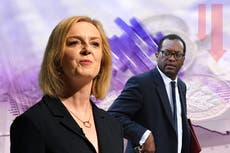Government may consider benefits cut to help fund tax breaks for rich, economists warn
Huge ‘unforced error’ set to push Britain back to George Osborne-era cuts, says think tank
Liz Truss’s government is on course to make public spending cuts of almost £50bn a year after the “unenforced error” of Kwasi Kwarteng’s mini-Budget, according to top economists.
Experts at the Resolution Foundation warned that Britain’s public sector was heading for a return to the austerity period imposed by the David Cameron-led Tory government.
If Ms Truss refuses to U-turn on her borrowing-fuelled splurge on tax cuts, the level of spending cuts will have to be “broadly the same or bigger” than then-chancellor George Osborne set out in 2010 after the banking crash, the think tank said.
The government is likely to need to announce fiscal tightening of between £37 and £47bn a year in order to meet a commitment to get debt falling by 2026-27, the Resolution Foundation warned.
Ms Truss confirmed on Thursday that she and her ministers are now looking for cuts across government – declaring that there are “plenty of areas” where taxpayers’ money could be saved.
“There are always ways that we can organise things more efficiently. What I want to make sure is that taxpayer money is focused on frontline services,” the prime minister told broadcasters.
Whitehall sources told The Independent that the Treasury had written to all departments asking them to find savings. Asked about the efficiency drive, a spokesperson said: “The British taxpayer expects government to run as efficiently and effectively as possible.”
The prospect of austerity has sparked anger among unions and campaigners, who warned the cuts to pay and services would be “an act of national vandalism and a huge betrayal of the British people”.
A group of 18 trade unions wrote to the PM demanding a “cast iron assurance” she would honour a Tory leadership campaign pledge that there would be no cuts to public services, already struggling with the impact of inflation.
“Frontline services are already at breaking point. They must not be sacrificed to make the top 1 per cent even richer,” said the letter signed by the TUC’s Frances O’Grady, Unite’s Sharon Graham and others. “We won’t allow the social fabric of this country to be destroyed.”
Mr Kwarteng has promised a “medium-term” fiscal plan on 23 November to spell out how he will balance the nation’s finances and a £45bn-a-year tax giveaway disproportionately benefiting the rich.
The Resolution Foundation said the market turmoil which has seen traders dumping government bonds had increased the UK’s debt interest costs by around £12.5bn a year by 2026-27.
Torsten Bell, the think tank’s chief executive, said the huge package of tax cuts “without any explanation of how they would be paid for” was the “biggest unforced economic policy error of my lifetime”.
Warning of “unpleasant” cuts ahead, the top economist added: “The intention may have been to emulate Margaret Thatcher – but the reality may involve looking a lot like George Osborne in the years ahead.”
The Resolution Foundation suggested that the “painful” policy choices that the Treasury would now have to consider include cutting public investment projects and abandoning the pledge to increase defence spending to 3 per cent of GDP by 2030.
The think tank said the government could consider uprating benefits and pensions by earnings instead of inflation – a 4 per cent real-terms cut. This would save £20bn over two years, but would cost a typical low-income family with two children over £1,000 a year.
NHS Providers have warned that cuts to the health service would represent a “huge setback” to a service already stretched by a decade of austerity. “NHS budgets are already severely stretched,” Miriam Deakin of the trusts’ membership body told The Independent.
Unison general secretary Christina McAnea said the prospect of NHS budget cuts was “terrifying” and would exacerbate the existing “exodus” of staff leaving after the Covid crisis.
School leaders also reacted with alarm to the prospect of a return to austerity. Paul Whiteman, general secretary of school leaders’ union NAHT, told The Independent: “An economic policy of further cuts to public services at this point would be disastrous.”
Treasury minister Chris Philp said government departments have been asked to stick to existing spending limits during the current three-year settlement – as well as being asked to make efficiency savings.
However, Mr Philp argued on BBC Radio 4’s Today programme that “iron discipline” on public spending would not necessarily lead to austerity.
“If we can get economic growth going, which is our intention, it will lead to wages going up and lead to new and better jobs being created and will ultimately pay the taxes that fund public services like health, the NHS and so on,” he said.
Mr Philp suggested the government may not hike benefits in line with inflation in April 2023 as promised, while Mr Kwarteng said it was “premature for me to come to a decision on that”.
Charities warned that U-turning on a commitment to increase benefits in line with inflation would lead to disabled people “starving and freezing in their own homes”.
The Child Poverty Action Group said “unless benefits are uprated to match inflation, [children] will also become the casualties of a collapsing economy”.
Join our commenting forum
Join thought-provoking conversations, follow other Independent readers and see their replies
Comments



Bookmark popover
Removed from bookmarks